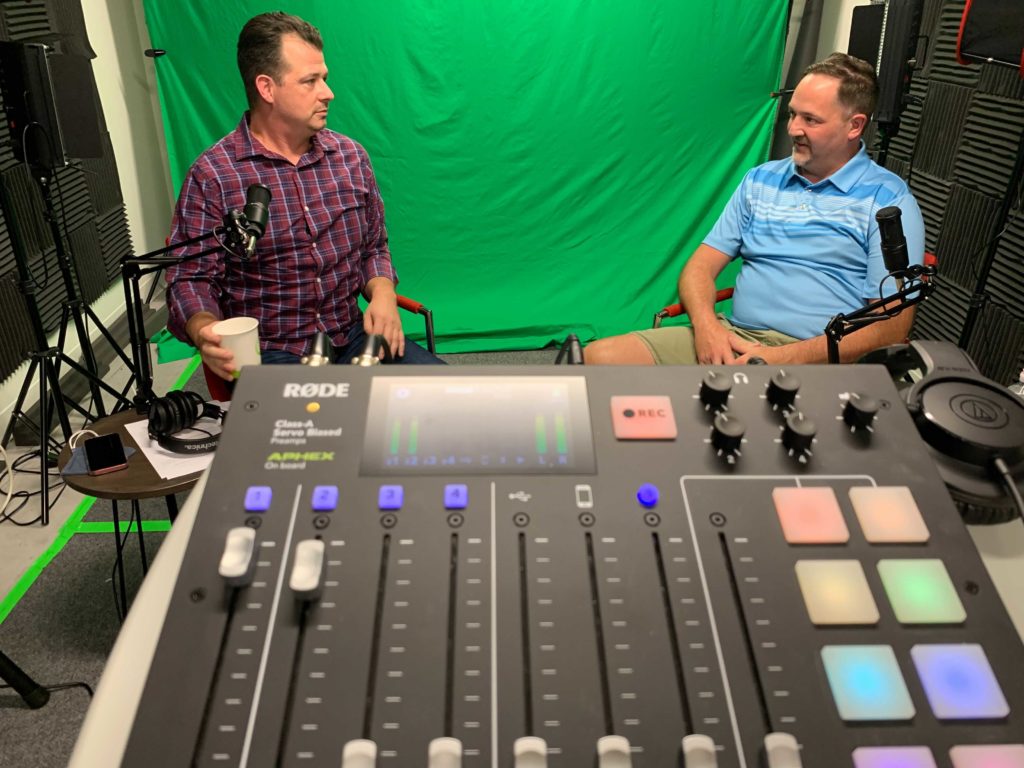Until early 2020, most companies were only beginning to come around to the idea of remote work and flexible schedules but the pandemic forced us all to pivot and adapt – nearly overnight. As things continue to change, the future of work is starting to look a lot different than we might have imagined. In the DE Talk season three opener, Director of Employment Brand at Community Health Network Scott Sendelweck sits down with RocketBuild Chief Innovation Officer Jason Ward for a chat about breaking old and inefficient work traditions, technology’s new role “in the office”, work-life balance, and the future of work as it continues to evolve with current events. Take a glance at this sneak peek of the conversation below, and then be sure to listen to the full episode – you don’t want to miss it!

Pictured Above (left to right): Jason Ward from RocketBuild chats with Scott Sendelweck from Community Health Network on the shift to remote work and how the Indianapolis-based healthcare network made the drastic change.
Jason Ward:
I think one of the core topics to get to today is the erosion, or destruction even, of the 8-to-5 workday. It has just gone away for a lot of us that don’t have to be physically in a place to do our jobs. What has that been like for you and for your team?
Scott Sendelweck:
When I first thought a little more about the 8-to-5 workday for my team specifically in the marketing world, marketing never sleeps, right? Sales never sleep, our hospital never sleeps. Why would we ever sleep ourselves? But I guess on a serious note, yeah. There’s like an 8-to-5 type of mentality, that traditional mentality. We threw that out the window. There is no way we could operate that under crisis situations and incident commands and under a pandemic. And that 8-to-5 mentality is gone and that really doesn’t exist in healthcare anyway. It’s a 24-hours-a-day, seven-days-a-week, 365. And we’ve really strived to do that in the marketing world as well.
Jason Ward:
Yeah. So, for your non-physical employees, people who are not in the hospitals or the clinics, or what have you, you were already accustomed to working some of those odd hours?
Scott Sendelweck:
Right. Yeah. I think part of the marketing, and then also the internal communications and just the brand, we’re definitely used to working a little bit off hours. I think for us, it’s more about the job or the project or the situation and let’s do our a 100% to get that done. When we get it done is not so much– or I guess the hours we get it done in – are not so much important as the quality of work we turned around at the end of the day.
Jason Ward:
So, you’d say you have a results-driven culture, more than a “clock in, clock out” culture.
Scott Sendelweck:
Yeah. I would say for some of the organization, we’re definitely a 100% results driven, right? We’re patient focused driven. We definitely want the best possible outcome for our patients at all times. And there are certain positions within our network where it is definitely a “clock in, clock out” situation, but during those “clock in, clock out” situations, that’s core set of hours that that position may require. It all is for the same thing.
Jason Ward:
Mm-hmm. So, how do you recruit and hire for that adjustment, which wasn’t a huge adjustment for you all, but adjusting to that new way of life, the COVID way of life, the remote work way of life. What has that done to your recruiting strategies?
Find out how the “new ways of work” have affected Community’s recruitment and D&I strategies, work productivity levels and more by listening to DE Talk Season 3, Episode 1 – and stay tuned in the coming weeks for another new and exciting episode! Want to make sure you’re informed when new episodes are released? Subscribe to our DE Talk email list to receive updates in your inbox, or text DETALK to 55678 to have the latest episodes sent to your mobile device!
